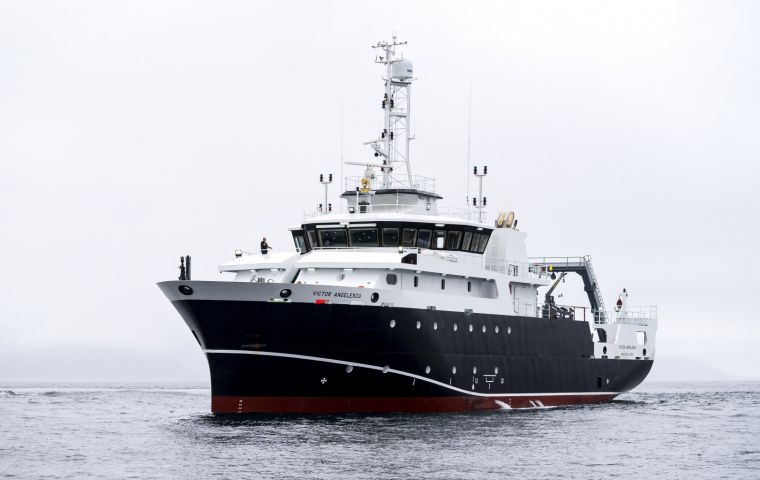MercoPress. South Atlantic News Agency
Argentine fishing research campaign in South Georgia Islands completed
 The authorities praised the Victor Angelescu's capabilities
The authorities praised the Victor Angelescu's capabilities A research expedition in the South Atlantic to further explore the oceanographic fishing scenario around the South Georgia Islands ended “satisfactorily” despite the “extreme” hydro-meteorological, environmental, and topographic conditions of the area, the Argentine Foreign Ministry and the Ministry of Science, Technology, and Innovation (MINCyT) announced this week.
The campaign was carried out between February 27 and April 3, 2023, aboard the Oceanographic Fishing Research Vessel (BIPO) Victor Angelescu, of the National Institute of Fisheries Research and Development (Inidep) to “survey the abundance of juvenile Patagonian toothfish and other demersal species on the platforms of the South Georgia Islands, and the Cormorant and Black Rocks,” the Argentine authorities said in a statement.
Specialists from Inidep and the Argentine Antarctic Institute (IAA) studied various aspects of the ecosystem of the sub-Antarctic island shelves, such as the fish and benthic invertebrate community, zooplankton, bacterioplankton, and phytoplankton, they detailed.
They also carried out a study of the marine environment, based on the characterization of the water masses, the distribution of nutrients, and the variables associated with ocean acidification processes, they added.
The data collected ”will allow reinforcing scientific knowledge on the species that inhabit the area, and adding information on fish populations that will contribute to the sustainability of the Patagonian toothfish (Dissostichus eleginoides) fishery in South Georgia, which is regulated by the Ccrvma”, they explained.
The expedition was a joint undertaking by the Foreign and Science Ministries and it also involved the Economy Ministry's Secretariat of Agriculture, Livestock, and Fisheries through Inidep, under the Science Ministry-sponsored inter-ministerial Pampa Azul Initiative regarding scientific support to national ocean policies.
The study was carried out within the framework of the Convention on the Conservation of Antarctic Marine Living Resources (CCAMLR), of which Argentina is a founding party.
“The campaign was carried out satisfactorily considering the extreme hydrometeorological conditions, the environmental and topographic characteristics of the area,” both ministries said. They also underlined that “the capacities of the vessel and the equipment used and the commitment and efficiency of the crew contributed to the success of the task, carrying out fishing and environmental research activities in the waters of the sub-Antarctic insular sectors of our country.”
The expedition was in line with the provisions of Decree 2316/90 on national Antarctic policy, which assigns priority to scientific research related to knowledge of the environment and fishing resources in order to promote their conservation, they concluded. (Source: Telam)




Top Comments
Disclaimer & comment rules-

-

-

Read all commentsTurns out that they had to get permission from the British to carry out the research in the first place.
Apr 09th, 2023 - 01:23 pm +2https://www.gov.uk/government/publications/marine-science-research-msr-guidance/marine-science-research-msr-guidance
And were: ‘required to provide the Coastal State, with preliminary reports, as soon as practicable, and with the final results and conclusions after the completion of the research’.
That must have hurt.
It’s all very nice of them, I’m sure.
Apr 07th, 2023 - 12:33 pm +1However surely it would more useful for them to survey Argentinian waters???
It makes good reading news for them, an Argentine vessel in South Georgia waters, it allows them to feed more propaganda to the masses,
Apr 07th, 2023 - 01:19 pm 0Commenting for this story is now closed.
If you have a Facebook account, become a fan and comment on our Facebook Page!